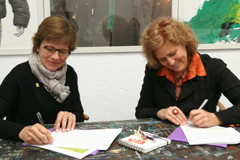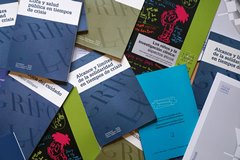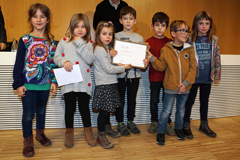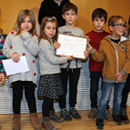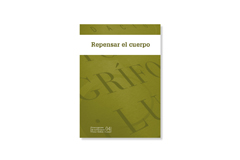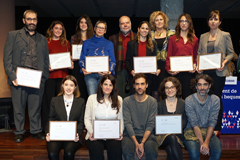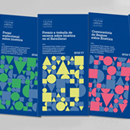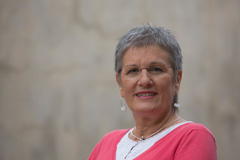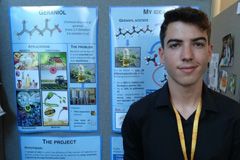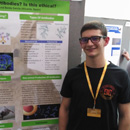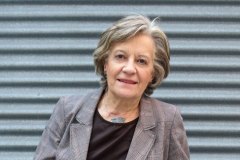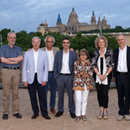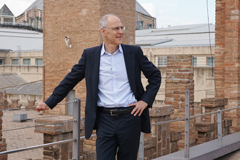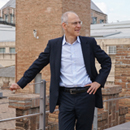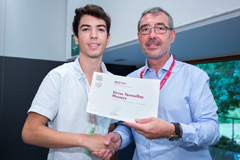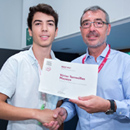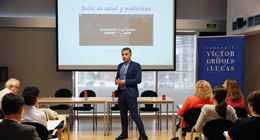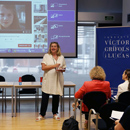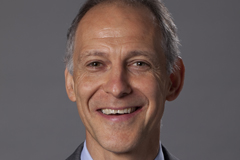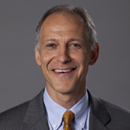First prize to "The Royal Philanthropic Vaccination Expedition. Bioethics yesterday and today" Escuela San Gabriel, Viladecans.
Second prize to "Shall we change?" Betania Patmos School, Barcelona.
Third prize to "The tree of children's rights" Les Pinediques School, Taradell.
Special mention:
• "Capability with a soul" Centro San Juan de Dios, Valladolid.
• "QC-Aspace: humanizing technology" Instituto Quatre Cantons, Barcelona.
• "The environmental storyteller" INS Berenguer d'Entença de l'Hospitalet de l'Infant.
The jury of the Víctor Grífols i Lucas Foundation Bioethics Prizes and Grants has announced the winners of this year's awards.
RESEARCH GRANTS
Ana M. González Ramos of the Open University of Catalonia, for the study: "Uso ético de las redes sociales en el caso de los trastornos de conducta alimentaria." [Ethical use of social media in the case of eating disorders.]
The team led by Silvia Poveda Moral at Fundació Sanitària Mollet for the study "Barreras en la gestión del documento de voluntades anticipadas y planificación de decisiones anticipadas en servicios de urgencias y emergencias médicas". [Obstacles in the management of the advance directive and advance decision planning document in medical emergency services.]
Andreu Segura Benedicto, doctor specialized in public health, for the study: "La ética de la ignorancia y la ética de la incertidumbre. Elementos para comprender y prevenir la iatrogenia".
[The ethics of ignorance and the ethics of uncertainty. Elements to understand and prevent iatrogenics.]
Mònica Sumoy Gete-Alonso of Rovira i Virgili University for the study: "La representación cinematográfica del cuidado de la salud física, mental y emocional del ser humano y sus implicaciones éticas". [The cinematic representation of care for the physical, mental and emotional health of human beings, and the ethical implications.]
Priscila Giraldo Matamoros of Fundació Institut Mar d'Investigacions Mèdiques for the study "La reconciliación después del error médico: la mediación como herramienta de ayuda a las víctimas". [Reconciliation after medical errors: mediation as a tool to help victims.]
The team led by Albert Granero Lázaro of Consorci Corporació Sanitària Parc Taulí for the study "Puesta en marcha de un proceso de planificación de decisiones anticipadas en pacientes con trastorno mental severo (TMS) en un centro de salud mental". [Implementing a process for planning advance directives in patients with severe mental disorder (SMD) at a mental health centre.]
SENIOR HIGH SCHOOL PRIZES
First prize to Ciencia y bioética en la ficción [Science and bioethics in fiction] by Marta Vecino Perez, a student at Institut Ribera Baixa, Prat del Llobregat.
Second prize to El consentimiento informado en ensayos clínicos con pacientes pediátricos [Informed consent in clinical trials with paediatric patients] by Laia Pérez Pucurull, student at IES Joan Boscà, Barcelona.
Third prize to El diagnóstico genético preimplantacional: aplicaciones, bioética y perspectivas de futuro [Preimplantation genetic diagnosis: applications, bioethics and future prospects] by Maria Bretones Vallejo, student at Col·legi Jesús Maria de Sant Andreu, Barcelona.
AUDIOVISUAL PRIZE
Documentary "Morir abans de néixer" [Dying before birth] by Núria Jar Benabarre with the support of The Cannonball Film Company.
Special mention to documentary Séptimo Piso (Seven floor) by Ànnia Monreal, Raül Clemente and Xavi Herrero.
Milagros Pérez Oliva will bring her media experience to bear on the study and promotion of bioethics.
She has been with Spain's leading daily newspaper, El País, since 1982, where she has been senior editor of the paper's Catalonia and Opinion sections, and was reader's editor from 2009 to 2012. She currently writes articles and editorial columns. She is also an interviewer on Terrícoles, produced by Barcelona TV channel Betevé, and appears as a political analyst on a number of programmes, including Hora 25 on Cadena Ser, els Matins on TV3, El Matí on Catalunya Radio, and Vespres on Spanish national broadcaster TVE2.
She was a member of the Bioethics Committee of Catalonia for eight years, and is currently on the Public Health Advisory Board, and is a member of the board of Pompeu Fabra University. She has won a number of awards, including the Government of Catalonia's National Culture Prize for Journalism, the Grifols Prize for Bioethics, and Barcelona City Council's Social Well-being Award. She also received the Josep Trueta Medal for contributions to health, from the Government of Catalonia.
Víctor Torrecillas and David Belda travel to London as winners of BIYSC
Víctor Torrecillas and David Belda won the prize awarded jointly by Fundació Catalunya-La Pedrera and the Víctor Grífols i Lucas Foundation for their projects as part of the Barcelona International Youth Science Challenge 2017 BIYSC, a summer school designed to give young students the opportunity to conduct projects at Catalonia's leading research centres.
David Belda from Alicante, who is about to start an undergraduate degree in Chemistry at the University of Valencia, won the prize for his essay: "Is animal immunostaining efficient and ethical?" He began the project at BIYSC during a laboratory internship at the Institute of Research in Biomedicine, Barcelona (IRB) where he worked on fruit flies, and the use of these insect tissue to create antibodies. He enjoyed the experience so much that he decided to pursue the subject further. In his project, Belda reflects on the moral aspects of animal research, in this case involving fruit flies, considers whether such procedures are ethical, and argues that research should explore other options that do not involve exploiting and killing animals.
Víctor Torrecillas, who is about to start his first year at Barcelona Medical School, won his prize for "Mutating LAE5 through bioinformatics tools to obtain a source for high-yield geraniol production", which focuses on research into an enzyme that makes it possible to increase the yield of a geraniol molecule. Torrecillas explains that, "this is a molecule with multiple applications in the food, cosmetic and biofuel industry," hence his interest in researching it.
The BIYSC awards made it possible for Víctor Torrecillas and David Belda to participate in the London International Youth Science Forum (LIYSF), a prestigious programme that brings together students from across the world and is now in its 60th year. The event lasts two weeks, during which participants can attend lectures from leading scientists, visit some of the UK's top laboratories and universities, and meet fellow students from across the globe.
David Belda described his time in London as, "Amazing! It exceeded my expectations and I was really impressed by the quality and stature of the lecturers." The experience has confirmed his passion for research, a bug that he caught while still at school. During his time in London, David made a particular effort to attend talks and lectures relating to chemistry and renewable energy. "I learned a lot about some of the latest issues that I'm particularly interested in," he explained.
Víctor Torrecillas was also enthusiastic about his time in London. "It was a great opportunity to learn a lot both at the scientific level but also by interacting with people from all over the world." Víctor would also like to pursue a career in research. "In addition to working in clinical medicine, I would like to find a specialty that would enable me to conduct research," he explained. He was particularly impressed by the quality of the speakers in London, "who are international leaders in their specialist fields". And he also reaffirmed his commitment to his vocation by attending numerous sessions related to medicine. Of these, he particularly enjoyed a lecture on tropical medicine, with contributions from health professionals with experience of treating diseases such as malaria in Africa.
In addition to the scientific and research content, the two prizewinning students both said they had benefited from the experience of visiting London, and the opportunity to meet and make friends with students from countries as diverse as Australia, the United Arab Emirates and Mexico. "Contact with people of our own age from very different cultures was incredibly enriching," they agreed.
Publication analysing the paid and altruistic models of plasma donation. Offers ethical considerations and describes the models that exist in Catalonia and the United States. Draws on contributions from industry experts, blood bank professionals, doctors, donors and patients.
The university also has awarded honorary doctorate to Adela Cortina.
The University of Salamanca has awarded honorary doctorates to Victoria Camps, emeritus professor of Moral Philosophy and Politics at the Autonomous University of Barcelona and president of the Víctor Grífols i Lucas Foundation, and to Adela Cortina, professor of Ethics and Political Philosophy at the University of Valencia.
Camps expressed her delight to be sharing this honour with Adela Cortina, and thanked the University of Salamanca for recognizing "two women who have worked hard to communicate the ethical principles and values of our society, and to seek answers to some of the most difficult questions we face, at a time when we need to analyze and address problems that require solutions which go beyond purely legal considerations. This is the terrain of philosophy: of reflecting upon, discussing and weighing up the consequences of scientific and technical progress."
The second day of the 11th Egozcue Lectures was dedicated to the subject of ethics in research. Such activity aims to improve human health, and the participants in any study are a means to achieving this goal. However, if people are used to this end and no significant benefits are obtained, then the result is exploitation. The role of ethics is to minimize such risks.
According to Ezekiel Emanuel, Chair of Medical Ethics at the University of Pennsylvania, ethics in research needs to be given far higher priority, instead of its current limited role, and it needs to be more rigorous. Ethics committees have many guidelines to help them analyze whether research is ethical – the Nuremberg Code, the Helsinki Declaration, the Belmont Report, CIOs, Common Rule, etc. – but these agreements are often contradictory and, having been created to address specific situations, frequently lack a general perspective.
Ezekiel Emanuel's team has worked over recent years to develop a series of ethical principles that should be considered before undertaking any research procedure: studies should contribute value to society; their results should have significant scientific value; the fair selection of trial participants is essential; the risk–benefit ratio must clearly favour the benefits; the informed consent of patients is essential; and participants must be respected. Emanuel argues that only if all of these principles are satisfied should the research go ahead.
The most important principle is the one that refers to the risk–benefit ratio. He argues that it is essential not to base the risk analysis for any study on intuition, and that it should instead be subject to systematic evaluation. To achieve this, he proposes a detailed data analysis from which to extract risk–benefit conclusions for any research project. To analyze these variables, the group has established a set of guidelines which stipulate that an investigation project with minimum risks is one in which the difficulty or harm it may pose for participants is no greater than what might be encountered in daily living. Risk is a part of daily life (domestic accidents, traffic accidents, sporting injuries etc.). This statistical analysis should then be used to determine the percentage of daily risk in the specific environment, and to compare it with the objective risks of the research. If the risk this entails is equal to or lower than the minimum daily risk of the environment in which the study is to be performed, the research can be conducted; otherwise, it should be ruled out.
Biomedical research in Spain
The final event was a penal discussion with leading researchers Manel Esteller (researcher at Bellvitge Institute of Biomedical Research), Bonaventura Clotet (director of IrsiCaixa), Mercè Boada (medical director at Fundació Ace) and Joan MV Pons (scientific coordinator at Aquas health evaluation and quality agency). They all agreed on the importance of research as a generator of knowledge, wealth and health. In general, the outlook is positive, with Spain boasting plenty of world-class research talent. However, researchers emphasize the need for public bodies to back research and not to reduce budgets in the face of crises such as that seen in recent years. They also argue for continued support for projects such as ICREA, which attracts talent from across the globe but in recent years has suffered budget cuts.
Participants in the panel discussion advocated the need to promote a culture of research, which should start by teaching people about the benefits of such activity for the territory where it is located. We also need to promote fundraising at the individual and corporate level, explaining the economic benefits that may derive from the research. These practices are commonplace in some countries, but there is little tradition of them in Spain. Finally, researchers noted the need to take a more balanced approach to the issue of publication, as recent years have seen the withdrawal of numerous publications as a result of failure to satisfy scientific research standards. It is important to find other ways of recognizing the work of doctors and scientists, ensuring that such recognition does not take the exclusive form of the number of publications in prestigious journals and mentions in the literature.
They will significantly improve healthcare throughout the world, although speed of implementation will vary from country to country
Watch the video about his lecture
Ezekiel Emanuel, North American oncologist and specialist in bioethics, was the guest speaker at the 11th edition of the Josep Egozcue Lectures, held in Barcelona on 13 and 14 April. In the first of his two lectures, Emanuel identified six trends that will influence health and clinical research over the next 10 years. In his opinion, these trends will significantly improve healthcare throughout the world, although speed of implementation will vary from country to country.
Emanuel, chair of clinical bioethics at the University of Pennsylvania, believes that over the coming decade more efforts will be focused on chronic diseases. The progressive ageing of the population will require changes in our approach to a category of diseases which, in the USA, already account for the majority of health spending. This will require us to identify people at risk of suffering from chronic diseases, and will mean that doctors have to give managers responsibility for monitoring patients, to identify their needs and to control the treatments prescribed. It is therefore very important to educate people about their illness and what they can expect of it.
Another issue that Emanuel believes will grow in importance in the future concerns our approach to mental illness. Currently, almost all countries treat such conditions separately, often in facilities that are completely independent of those where physical diseases are treated. Over the next 10 years, this separation will have to be reduced so that patients can receive combined care. Many patients affected by other diseases also suffer from mental conditions caused by their physical illness (for example, depression in cancer patients). It is essential for doctors to work in coordination with psychiatric specialists and for there to be closer coordination between them to improve the health system.
Outpatient care will become more common. The trend is towards reducing interventions at medical centres, providing them in patients' homes, instead. Emanuel noted that, in the field of oncology, many treatments are now available in this way. This is a slow process, as politicians are reluctant to close hospitals, but the shift from hospital- to home-based treatment will save money and improve care. In addition to improvements in quality and comfort, according to the statistics, home-based care also reduces mortality and increases patient satisfaction.
At the same time, there will be greater measurement of the performance of hospitals and doctors, comparing their activities and practices. This will generate competitiveness, which will bring benefits in mutual learning and the sharing of best practice. There will also be changes in payment systems. At present, treatments are paid for on a fragmented basis: initial visit, analysis, pre-surgery, etc. The trend will be towards block pricing with adjusted fixed amounts. This will save money and increase the efficiency of treatment.
Finally, with respect to drug costs, Ezekiel Emanuel is not optimistic. Forecasts suggest that these will continue to rise. This is because in countries such as the USA monopolies continue to be granted for certain drugs and competition is not allowed. Research is not as expensive as final drug prices imply, but the greatest research effort is concentrated in areas where a lot of money can be made. In the USA, work is currently in progress on 631 cancer drugs, but there are very few projects in the development of antibiotics. This is because, although antibiotics are absolutely vital for people's health, they are not as profitable as cancer drugs.
Víctor Torrecillas and David Belda are the winners of the awards given by the Victor Grifols i Lucas Foundation and Catalunya la Pedrera Foundation.
Senior high school students Víctor Torrecillas and David Belda are the winners of the BIYSC Awards 2017, a prize given by the Victor Grifols i Lucas Foundation and Fundación Catalunya la Pedrera to recognize research projects presented at the Barcelona International Youth Science Challenge (BIYSC) 2017. This international programme is designed to promote interest in science and educational excellence among young people aged from 16 to 18, across the world. The winners received a grant to enable them to participate in the London International Youth Science Forum (LIYSF), a scientific event for students from different countries, to be held in London this summer.
Víctor Torrecillas is in his second year of the baccalaureate at Centre d'Estudis Montseny-Poblenou, Barcelona. Torrecillas' entry for BIYSC 2017 was an essay titled "Mutating LAE5 through bioinformatics tools to obtain a source for high-yield geraniol production". David Belda studies at Kings College, Alicante, and submitted a project on biomedicine and ethics with the title "Is animal immunostaining efficient and ethical?"
The Foundation promotes ethical debate in a world in which our communication processes are being transformed
The transformation we have witnessed in the world of communication over the last two decades – which affects information sources, formats, distribution channels, access devices and participants in the communication process – means we need to review the role of advertising and its impact on health, not only from the perspective of health and medicines (drugs, care services and providers, different treatment options and therapies, institutional health promotion campaigns) but also any campaign that could have an impact on people's health or is related to diet and lifestyle. To address these topics and stimulate dialogue, on 5 June – in partnership with Pompeu Fabra University (UPF) – we held a seminar that brought together experts and professionals from a wide range of backgrounds to consider the impact of advertising on health.
The opening address was given by Gema Revuelta, director of the Centre for the Study of Science, Communication and Society at UPF, in which she provided an overview of the new media landscape and the transformation the sector has undergone. She argued that our consumption of media content is not just passive but is also an active process. These changes mean that further regulation is required in the field of health, and this in turn entails far-reaching ethical considerations.
Jordi Pérez, a member of the Scientific Educational Research Group at UPF, reflected on the influence of advertising on attitudes and behaviours. Pérez looked at how advertising messages are constructed, starting with a persuasive intention, based on a message's credibility and attractiveness and its capacity to connect with the potential audience.
Patrici Calvo, lecturer in bioethics at Universitat Jaume I, Castellón, summarized the current digital transformation. In particular, he warned of the potential dangers – particularly with regard to health issues – for vulnerable groups in this new scenario. The use of techniques based on artificial intelligence offers huge benefits but also poses considerable risks such as undermining privacy or the possibility of algorithm-based decision-making which, in the case of marketing and advertising, can give rise to serious errors and to aggressive and inappropriate campaigns. To address this issue, Calvo argued that we need to strengthen our control systems, promoting mechanisms based on systems to monitor ethical compliance in advertising, the creation of codes of ethics, and the expansion of ethical audits.
Legislation was a key focus of discussion throughout the day. Nuria Amarilla, senior partner at Eupharlaw, summarized the legislation that currently governs advertising activity. She stressed that there is already adequate legislation to regulate advertising activity, but argued that it is essential to keep this under constant review to fill any legal vacuums that may arise as a result of ongoing changes.
The discussion also covered the issues of self-regulation and control. Charo Fernández, assistant directory general of Autocontrol, explained what her organization does. This is a nonprofit body created by the industry in response to society's calls for guarantees to ensure that advertising is accurate and trustworthy. It brings together advertisers, advertising agencies and media organizations, and is designed to ensure compliance with advertising legislation. Fernández argued that "it is precisely the stakeholders in the advertising industry who have the biggest interest in ensuring that the rules are respected." The number of inquiries from companies, agencies and media organizations continues to grow and, during the course of 2018, Autocontrol expects to receive almost 5,000 requests to review campaigns, the majority of which correspond to advertising for healthcare, health products and food.
Carlos Mateos, coordinator of the platform #SaludSinBulos (#HealthWithoutRumours) used some examples to demonstrate how easily fake news can spread. This is particularly dangerous when it affects people's health, as it can give rise to beliefs and behaviours which harm people's health. To address this problem, Mateos explained the various initiatives promoted by his platform, which involve developing materials to encourage people to take a critical approach to information, revealing the sources of fake news, sharing knowledge of credible sources and, more generally, promoting a more sophisticated knowledge culture.
The seminar ended with a session dedicated to analyzing advertising's influence on the construction of people's self-image. Mónika Jiménez of the UPF's Observatorio MediaCorp explained the research activity of this organization in recent years, to empirically demonstrate that advertising offers a distorted image of the body. Jiménez pointed out that advertising aimed at adults is also consumed by minors, who absorb stereotypes that do not reflect reality. According to a study conducted in 2015 analyzing the 150 adverts with the highest viewing figures among children in Spain, 72% of these featured people with near-perfect bodies. This has a major effect, as it generates a distorted body image and the pursuit of impossible aesthetic ideals. Jiménez explained that MediaCorp, in addition to research, also promotes materials to encourage children to read information critically and organizes workshops to help counter-act the false body image often offered by advertising.
The final contribution of the day came from Begoña Román, lecturer in Ethics at the School of Philosophy (UB) and Chair of the Social Services Ethics Committee of Catalonia, who offered some philosophical reflections on the contents of the seminar. She argued that we need an ethical commitment to underpin the stance that advertising should not be a free-for-all. "Health-related advertising does not generate self-confidence, respect and self-esteem, despite the fact that this is precisely what its proponents often claim."
Ezekiel Emanuel, oncologist and specialist in bioethics, is Chair of the Department of Medical Ethics and Health Policy at the University of Pennsylvania. He advised the White House on health policy from 2009 to 2011.
His lectures will consider, among other issues, megatrends in medicine and ethics in clinical research with human beings, focusing on developing countries.
June 13, "Megatrends in Medicine"
June 14, "The Ethics of ‘Second-Best' Care: conducting research in Developing Countries"
The lecture will be followed by the panel discussion "Biomedical research in our society" with: Manel Esteller, Director of the Epigenetics and Biology of Cancer Programme, Institute of Biomedical Research, Bellvitge (IDIBELL); Bonaventura Clotet, director of IrsiCaixa; Mercè Boada, medical director of the ACE Foundation and Joan Pons, scientific coordinator of Health Quality and Evaluation Agency (Aquas).
Caixaforum
Av. de Francesc Ferrer i Guàrdia, 6-8
08038 Barcelona
Free registration.

